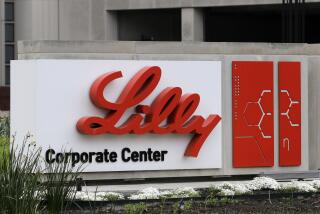Amgen Drug for Parkinson’s Fails in Clinical Trial
- Share via
A treatment for Parkinson’s disease that Amgen Inc. considered one of the most promising drugs in its research pipeline didn’t work in a clinical trial, the Thousand Oaks biotechnology company said Monday.
The drug, called GDNF, had produced startling results in earlier studies involving small numbers of Parkinson’s patients.
This spring, Amgen showed analysts a video of a Parkinson’s patient who was able to jettison his walker after treatment.
Amgen said it was trying to figure out why the latest study failed to produce the same results. Company scientists believe the dosage or duration of treatment in the recent study may have been inadequate, said Andrea Rothschild, a spokeswoman for the company.
Although Amgen had high hopes for the drug, Wall Street expected that, at best, GDNF would be a modest moneymaker.
The medication is delivered directly to the brain through tubes that lead from a pump implanted in the patient’s abdomen. Investment analysts said the difficult and costly operation needed to insert the device would be a significant drawback.
Analyst Geoffrey Porges of Sanford C. Bernstein & Co. had forecast annual peak sales of $250 million to $300 million for GDNF.
Amgen has made no decision regarding the future of the drug, and the 34 patients in its study continue to receive GDNF, Rothschild said. “There are a lot of questions and things we need to understand.”
Amgen’s shares slipped 57 cents Monday to $53.56 on Nasdaq on a day when the markets generally were down.
Parkinson’s is a degenerative disorder that affects an estimated 1.2 million people in the U.S., including former boxing champion Muhammad Ali and actor Michael J. Fox. There is no cure.
Although the cause of Parkinson’s is unknown, its symptoms stem from a lack of the brain chemical called dopamine. GDNF is believed to protect cells that produce dopamine.
The disappointing study results come as Amgen is overhauling its research operations to plug gaps in its product development pipeline.
The setback adds to the pressure on Amgen to succeed with AMG 162, a bone drug that is considered promising but is several years from the marketplace. At the company’s spring meeting with Wall Street analysts, Amgen said the intravenous osteoporosis treatment was better than Merck & Co.’s popular Fosamax and had peak sales potential of $2 billion a year.
“They really have a big burden on their backs to deliver on it,” Porges of Sanford C. Bernstein said.
Amgen had total revenue of more than $8 billion last year.
GDNF has had a checkered history at Amgen. The company acquired the drug when it purchased Synergen, a Colorado biotechnology company, in 1994. The drug is a synthetic version of a protein called glial-derived neurotrophic factor, which protects and stimulates specific dopamine-producing brain cells.
Amgen tested GDNF in the late 1990s but relegated it to the back burner in 1999 after disappointing results in a clinical trial in which the drug was injected into patients’ brains. Small groups of academics continued to work with the drug and found that patients improved when GDNF was continuously pumped into their brains.
The Amgen video featured one of five patients who was in an early-phase trial in England. Amgen said the patient received GDNF for at least a year.
The recent Amgen trial was the first to test GDNF against a placebo. In Amgen’s study, half of the 34 patients received GDNF for six months and the remaining 17 patients received a saline solution. Brain scans showed a biological response to GDNF in patients who received the drug. But the brain activity did not translate into an improvement in patients’ abilities to perform such tasks as walking, talking and writing.
“That’s why we call it a clinical trial, not a clinical sure thing,” said Mark Monane, an analyst with Needham & Co. “This is a risky business.”
More to Read
Inside the business of entertainment
The Wide Shot brings you news, analysis and insights on everything from streaming wars to production — and what it all means for the future.
You may occasionally receive promotional content from the Los Angeles Times.










